A few years ago, I set a goal to read at least one book a month as I had allowed my phone, social media, etc. to greatly lessen my ability to stay focused. In 2023, I continued this challenge.
Here's what I read. Links to buy are available by clicking the photo of each book.
Ecclesiastes and the Search for Meaning in an Upside-Down World by Russell L. Meek
Non-Fiction, Theology
When I first heard about this book in 2022, I put it on my list and didn't pay attention to the fact it is only 69 pages long. This may color my view somewhat, as I was expecting a fairly in-depth look at one of the most fascinating books of Scripture. That being said, Meek was able to utilize parts biography, parts theology, and some academic work in this little book. Seeing "enjoyment of God's gifts as glimpses of both Eden and the new heavens and the new earth" are keys to understanding the book. While parts of this work can read like an extended term paper, many parts open our eyes to deeper meanings in Ecclesiastes and help us see not nihilism, but joy.
Everything Sad Is Untrue (a true story) by Daniel Nayeri
Non-Fiction, Memoir, Cultural Studies
I had heard positive things about this "both fiction and nonfiction at the same time" memoir from Iranian refugee Daniel (Khosrou) Nayeri prior to reading it. He writes from the perspective of his 12-year-old self and his experience fleeing from Iran after his mother converts to Christianity and has a fatwa imposed on her (the mom, Daniel, and his sister flee while the unbelieving father stays behind in Iran — a pivotal part of the story). Daniel is forced to leave a relative life of luxury and ease as part of a wealthy family (mom is a doctor and dad is a dentist) spending time in Abu Dhabi and Italy as a refugee before settling in Edmond, Oklahoma and living in poverty with an abusive stepfather and a cast of characters straight from most Americans' 12-year-old memories. While not explicitly a "Christian" publication, the story is also explicitly Christian (let the reader understand). Daniel's mother explains her choice of leaving comfort for struggle:
"It’s true and more valuable than seven million dollars in gold coins, and thousands of acres of Persian countryside, and ten years of education to get a medical degree, and all your family, and a home, and the best cream puffs of Jolfa, and even maybe your life. My mom wouldn’t have made the trade otherwise. If you believe it’s true, that there is a God and He wants you to believe in Him and He sent His Son to die for you—then it has to take over your life. It has to be worth more than everything else, because heaven’s waiting on the other side." (p. 197)
This is where the title comes into play. Everything sad is — eventually and eternally — untrue because of this truth.
I didn't know what to expect when I picked up this book, but I would enthusiastically recommend it to anyone from pre-teens to the oldest of adults. In short, it's filled with profound, and sometimes, hilarious, thoughts, often in the form of exceedingly deep thoughts in a single sentence, about what the life of a refugee is and is not. For me, it helps restore some humanity ("A patchwork story is the shame of the refugee") in an age where we breathlessly fret, fearfully demonize, and use a political pawns other humans — made in God's image — seeking life for themselves and their families.
While it's not a political, cultural, or even, necessarily, "religious" work, it's also all of those things at once. In other words, I think anyone would benefit from reading this beautiful work.
The Screwtape Letters by C.S. Lewis
Fiction, Fantasy, Religious Studies
I first read this book in my very early 20s and, for lack of another book to read this month, I pulled it off the shelf to read again — as a more "seasoned" adult. It's a classic for a reason. For the uninitiated, the book is an imagining of an elder demon, Screwtape, writing letters to his nephew, Wormwood, as Wormwood works on his human subject. While a work of fiction, Lewis helps us see there's a realm beyond the one we see in our earthly existence. We ignore it to our peril. I read this one slowly — a letter per day. All these years later, it still holds up.
Fargo Rock City by Chuck Klosterman
Non-Fiction, Cultural Studies, Music, Memoir
The closing line of Chuck Klosterman's 2001 book Fargo Rock City is "I absolutely could not relate to Mötley Crüe. And that's why I will always love them." Subtitled A Heavy Metal Odyssey In Rural Nörth Daköta, this now-22-year-old look at (mostly) 1980s rock and metal music (i.e. mostly pop metal and/or "hair metal") holds up despite significant age. For the record, I have the paperback copy with an epilogue penned in 2002. I have more books (10) by Chuck Klosterman than any other writer, so it's safe to assume he's my favorite writer. However, much has changed from the first time I read it as a young man in my mid-20s to this latest re-reading in my mid-40s. I still have a soft spot for the subject — hence my re-reading — as well as an appreciation of Klosterman's style. For what it's worth, his later books are almost completely different than this one — and much more dense in subject matter and thought. This deep-dive into his fandom of bands like the Crüe, Poison, Warrant, Bon Jovi, and the other stalwarts of 1980s pop metal still brings me joy to read as I tend to relate to this description: "Males have a weird sense of loyalty toward the bands they like; they sometimes view record buying as a responsibility." Klosterman's book is probably mis-titled as it's not really about North Dakota all that much (I mean, he DID grow up there and his small home town does play a role in the book) as much as it is about adolescence and the role music played in it for a certain portion of Generation X. He's a few years older than me, but his experience is fairly similar (with some significant exceptions). The musicians of that era were almost superheroes and not "real" people to adolescents like Klosterman and me. Axl Rose might as well have been Batman for all the mystery and intrigue surrounding him. In reality, of course, Axl is just a man (and, now, a man close to drawing Social Security). This two-decades-old book (my copy now has yellowing pages) is a fitting tribute to a time long since passed. However, I still had a great time reading it in 2023.
Go Outside & 19 Other Keys To Thriving In Your 20s by Jared C. Wilson & Becky Wilson
Non-Fiction, Christian Living
This one is, fairly obviously, not marketed to or designed for me as I am twice as old as the intended demographic for this short book. There are 20 chapters, each only a few pages, that are designed to provide wisdom to young adults. From the introduction to the conclusion, the book is a healthy dose of "if I could go back in time and talk to my younger self, this is what I would say." Drawing upon varying themes like choosing the right friends, realizing you don't know everything, and much more, there is much Ecclesiastes-like wisdom, that is also saturated with the gospel, here. Jared is a fantastic writer and his wife, Becky, proves she's no slouch either. I wish I had this book about 25 years earlier, but I'm not sure I would have listened back then. However, this is a very quick read full of wisdom that is a benefit to anyone who will read it (I read it cover-to-cover in about an hour and a half). Highly recommended for high school or college students or young adults setting out on their own.
Non-Fiction, History, Current Events, Cultural Studies
I heard about this book on a current events podcast to which I regularly listen. It sounded intriguing as I remember the events of Feb. 28 to April 19, 1993 fairly well, as I was a sophomore in high school as it unfolded. I actually started reading the book the day after the thirtieth anniversary of the raid and subsequent fire that claimed so many lives (it was not intentional that I started reading it on that date, but kind of weird nonetheless). I had always heard that "Waco" was the source of so much rage over the years, but I wanted to dive into the story a bit deeper. Guinn's "Waco" gives us much of the backstory of the Davidians, of which I was previously ignorant, as a radical offshoot of the Seventh-Day Adventist Church and its beliefs. Like other radical branches throughout religious history, the Davidians became something not necessarily representative of its foundations. By the time Vernon Howell (aka David Koresh) came along, it could very fairly be described as a cult — with many abhorrent practices. Fully half of the book is the lead-up to Feb. 28, 1993, when the ATF raided the group's compound. Without giving too much away, Guinn spares no one (Davidians, Koresh, ATF, FBI, other government officials) in his factual approach. He also corrects some narratives about various events, addresses various conspiracy theories, and spends ample time examining the group's beliefs, respectfully, but logically and with historical context. No one comes out of this book looking like a hero. Instead, he presents it for the tragedy it is — with dozens dead following the teachings of a man who was, fairly obviously, delusional.
Sorry I'm Late, I Didn't Want To Come: One Introvert's Year of Saying Yes by Jessica Pan
Non-Fiction, Biography, Psychology
Krista, a friend from our introvert-heavy church small group heartily recommended the book Sorry I'm Late I Didn't Want To Come to a few of us one Sunday evening. Looking for a book I could read in about a week on the beach, I decided to order this one. While, on the surface, it's a bit outside of what I might normally read, I found it to be relevant and often hilarious as author Jessica Pan recounts her year of trying to live like an extrovert. After all "modern society favors extroverts," she claims. To get it out of the way up front, she doesn't think there's anything wrong with being introverted and explains this. However, she found herself in a place of significant unhappiness and decided to try a year-long experiment to see if adopting extroverted traits would bring some balance to her life. Reading this book at a place where we go every year BECAUSE it's not crowded (but, unfortunately, the word is spreading about our secret) as a family of mostly introverts was a bit humorous, but I found myself challenged by Pan's approach. I may not adopt a similar experiment, but I had fun reading about her's.
Non-Fiction, Cultural Studies, Sociology
When I first put Bowling Alone on my Amazon wish list, I thought I knew what it was (my mother got it for me on my birthday because of the title alone — I once worked at a bowling alley when I was in high school). However, it was a much denser, more academic book than I had bargained once I dove into it. I stuck with it, despite it feeling like a college textbook in many places and am glad I did. As you may have noticed, "social capital" (the theme of the book) in America is dying. But, the real story is that it has been dying for a few generations. While it's easy to blame the Internet or a younger generation, in truth, this decline began sometime after World War II and has not abated yet (while not the sole cause, the introduction of television into homes is one of the largest factors in the decline of social capital in American life). The book is 20-plus years old, but this updated version includes a 30-plus page Afterword looking at the early effects of the pandemic, social media, and Internet usage. I wish I could provide a tidy summary for this book, but it's too expansive. If you like deep dives about "what's going on" in our worlds his may be a good one for you.
The Best of Me by David Sedaris
Non-Fiction, Humor, Essays
I've been reading humorist David Sedaris since the early 2000s when I happened upon a book of his at my local library and thought I recognized his name from occasional listening to NPR in that era. I had not read him in several years, but when I saw this best-of collection, I added it to my birthday list (my daughter purchased it for me). I found Sedaris to always be engaging, but sometimes a little rough for my taste. Reading this collection, I still laughed at his stories, but also found him to be more reflective as he ages. The last few essays — all focused on his family — are his best. There is a great deal of pain underneath his humor. While he manages to keep the reader engaged, you can't help but wince at some of his descriptions of and words from his late father, mother, and sister (as well as his other siblings). This collection is a good look at his writing career (I did wish for more stories about his brother Paul, aka "The Rooster"). If reading stories from people with vastly different lives and worldviews than your own is troublesome for you, Sedaris may not be your cup of tea. However, even in stories that made me wince, I still found some beauty in his writing and got a few laughs in the process.
Losing Our Religion: An Altar Call for Evangelical America by Russell Moore
Non-Fiction, Current Events, Cultural Studies, Religion
The final paragraph of Russell Moore's manifesto Losing Our Religion: An Altar Call for Evangelical America more or less sums up the whole book. "The challenge before us is not to "Make America Great Again" but to "Make Evangelicalism Born Again." And that's not a strategy. That's a prayer. Maybe when we're lost enough, we can re-find the Way. Maybe all the dangers, toils, and snares are worth it. Maybe only when we lose our religion will we be, once again, amazed by grace."
As the book's jacket summary states, the American church is losing a generation. It's not completely about doctrine or challenging teachings. It is losing a generation (or more) because the church in America — generally speaking — no longer really believes what they preach.
Each of the five chapters focuses on what we've "lost" (credibility, authority, identity, integrity, stability) and what can "save" (disillusion saves from deconstruction, truth saves from tribalism, conversion saves from culture wars, morality saves from hypocrisy, revival saves from nostalgia). What I appreciate the most is that Moore doesn't just diagnose the illness of the the American evangelical church, but also points us to the hope that "Jesus Saves" ("as he writes on page 253, "No matter how many people wave "Jesus Saves" signs over their atrocities and insurrections, that doesn't stop the fact that, well, he does.") as the solution for the church's crisis.
Moore hits a home run with this book. I could have highlighted about half of this book without much hesitation. I could offer quote after quote I found to be full of wisdom and truth. Instead, I'll leave you with this.
If you're a believer who is disillusioned with the church, I recommend this to you. If you think Russell Moore is a back-sliding, anti-MAGA, heretic who abandoned conservatism and the faith, I recommend you read this book and ask you to reconsider what you truly believe. If you are a non-believer looking at the American church and scratching your head at the last decade-plus, I recommend this book and urge you to consider who Moore points to as the ultimate hope for, not just the church, but all of mankind.
Battle Cry of Freedom by James McPherson
Non-Fiction, History
Battle Cry of Freedom has been hailed as the best single-volume work on the American Civil War. I am, by no means, an expert on the war, but I gave two months of my life to this 900-plus-page Pulitzer Prize-winning work. In 2022, I re-read Tony Horwitz's Confederates In The Attic for the first time in more than a decade and it sparked a desire to learn more about the most pivotal period in American history. My friend Richard Crabtree recommended this one to me. After seeing its size, I was reluctant to dive in. However, I'm glad I did and I'm glad I took a little extra time with it.
I won't rehash the war or all the details. Suffice to say, "secession and war had launched a revolution that changed America forever," as McPherson writes in the Afterword. As I grew up in Tennessee, I often heard how the war was a battle for states rights or the "war of northern aggression." Simply, this is a horrendous white-washing of the reality. As Abraham Lincoln stated in 1864, "That *perfect* liberty they sigh for is the liberty of making slaves of other people." Sure, there were economic factors and issues of liberty, but it ALL hinged on the belief that it was acceptable for one human to be able to own another human as property.
Reading this book in 2023, at a time in American history when it seems we are experiencing a renewed fraying of our ties is important, to me at least, was revealing. Only fools argue for a new civil war. I don't use that word lightly, but those advocating for secession or another civil war are simply that — fools. The war of 1861-1865 HAD to feel like the end of the world for many in this country, especially in the South. Starvation, famine, and other biblical-level maladies were apocalyptic in scope. McPherson details this as vividly as anyone since Ken Burns's late-20th century multi-episode PBS documentary (which, I need to now go back and rewatch). As Shannon and I toured a Civil War site in Franklin, Tenn., recently, one of our tour guides reminded us, in vivid detail, the war impacted REGULAR people, it wasn't just about politics, battle strategy, or war maneuvers. She accurately reminded us the Civil War was a 9/11-level event ... every day ... for four years. It was a COVID-level societal and cultural disruption ... every day ... for four years. There's simply no other event in American history that impacted who we are as this war did.
McPherson's work helps us understand it better than we may have before. Understanding history better helps us understand our present better.
The Power of Moments: Why Certain Experiences Have Extraordinary Impact by Chip Heath & Dan Heath
Non-Fiction, Self-Help, Communications
Our staff (I work at a church, by the way) read this one together. While not coming from a Christian perspective, the authors deliver thoughts applicable to any church in its efforts to effectively communicate with its people. On the surface, it seems to be about manufacturing moments. However, by the book's conclusion, you realize it's more about paying attention to people and making moments matter in our relationships and interactions — from both a personal and professional level. Finding these moments of elevation, insight, pride, and connection are the main themes in this easy-to-read book. I went in skeptical, but I was pleasantly surprised by how genuine it seems to be in efforts to get us to pay attention to one another and, ultimately, form deeper bonds by paying attention to the moments that matter in our lives.
Friendship With The Friend of Sinners: The Remarkable Possibility of Closeness With Christ by Jared C. Wilson
Non-Fiction, Theology, Christian Living
What a fantastic book with which to end my year of reading. Jared C. Wilson has been a mainstay in my life, albeit at an online distance, since the early days of online blogging (I searched for him — pre-social media — as he was an old college classmate of mine and we both wrote for the college paper). I don't say any of the following in any relation to that. Jared is one of the best writers I've ever read for taking complex, deep theological topics and making them relatable to a common man — all the while not losing his ability to take you deeper. Friendship With The Friend Of Sinners is the next installment in his catalog of writings that have done this extremely well. Chapter by chapter, Jared looks at how friendship with Jesus is possible, how he is our close friend in a world of surface relationships, how he is the available friend when it seems all others have left you, how he is the honest friend we all need who won't let you fool yourself. If you're lonely — and most of us are these days — Jared reminds us Jesus is near and actually *wants* to be friends with us. How amazing is this news? As with most years — as prolific as Jared is — a work by Jared C. Wilson is one I can heartily recommend to you.
The Holy Bible (English Standard Version Bible) [The Bible Project One Story That Leads To Jesus Reading Plan via YouVersion Bible App]
Non-Fiction
By my estimation, this year marks the ninth time I've read through the entire Bible in a year. This year, I once again utilized a plan by Bible Project, including their various explainer videos. These are tremendously helpful as you get ready to begin a new book of the Bible. I can't tell you any new revelations I had this year reading through Scripture. However, it's never NOT worth it. If you are a follower of Jesus, you can do this, too. It may seem overwhelming, but there are myriad plans for you to utilize. Any of Bible Project's plans are very helpful and I would recommend them to you.
MY TOP FIVE READS OF 2023 (BESIDES THE BIBLE, OF COURSE)
1. Battle Cry of Freedom by James McPherson
2. Losing Our Religion: An Altar Call for Evangelical America by Russell Moore
3. Friendship With The Friend of Sinners: The Remarkable Possibility of Closeness With Christ by Jared C. Wilson
4. Waco: David Koresh, the Brand Davidians, and a Legacy of Rage by Jeff Guinn
5. Everything Sad Is Untrue (a true story) by Daniel Nayeri


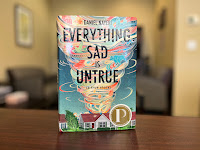


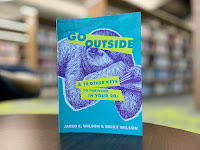
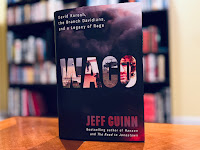

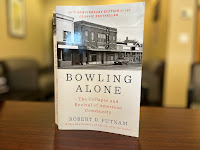
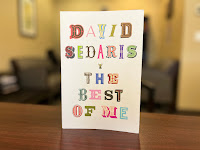





No comments:
Post a Comment